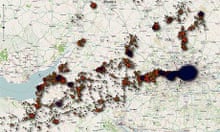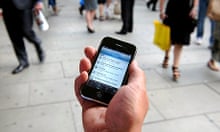Smartphones running Google's Android software collect data about the user's movements in almost exactly the same way as the iPhone, according to an examination of files they contain. The discovery, made by a Swedish researcher, comes as the Democratic senator Al Franken has written to Apple's chief executive Steve Jobs demanding to know why iPhones keep a secret file recording the location of their users as they move around, as the Guardian revealed this week. Magnus Eriksson, a Swedish programmer, has shown that Android phones – now the bestselling smartphones – do the same, though for a shorter period. According to files discovered by Eriksson, Android devices keep a record of the locations and unique IDs of the last 50 mobile masts that it has communicated with, and the last 200 Wi-Fi networks that it has "seen". These are overwritten, oldest first, when the relevant list is full. It is not yet known whether the lists are sent to Google. That differs from Apple, where the data is stored for up to a year.
In addition, the file is not easily accessible to users: it requires some computer skills to extract the data. By contrast, the Apple file is easily extracted directly from the computer or phone.
Google had not responded to requests for comment at the time this story was published.
Senator Franken has asked Jobs to explain the purpose and extent of the iPhone's tracking. "The existence of this information - stored in an unencrypted format - raises serious privacy concerns," Franken writes in his letter to Jobs. "Anyone who gains access to this single file could likely determine the location of a user's home, the businesses he frequents, the doctors he visits, the schools his children attend, and the trips he has taken - over the past months or even a year."
Franken points out that a stolen or lost iPhone or iPad could be used to map out its owner's precise movements "for months at a time" and that it is not limited by age, meaning that it could track the movements of users who are under 13. Another security researcher, Alex Levinson, says that he discovered the file inside the iPhone last year, and that it has been used in the US by the police in a number of cases. He says that its purpose is simply to help the phone determine its location, and that he has seen no evidence that it is sent back to Apple. However documents lodged by Apple with the US Congress suggest that it does use the data if the user agrees to give the company "diagnostic information" from their iPhone or iPad.
Apple has still not commented formally on the purpose of the file, despite repeated requests from the Guardian.
The discovery that Android devices - which are quickly becoming the best-selling products in the smartphone space - also collect location data indicates how essential such information has become to their effective operation. "Location services", which can help place a user on a map, are increasingly seen as important for providing enhanced services including advertising - which forms the basis of Google's business.
Eriksson says he uncovered the files after seeing coverage about the iPhone file. "Following the latest days internet outrage/overreaction to the revelation that iPhone has a cache for its location service, I decided to have look what my Android devices caches for the same function," he wrote at the site where he has provided computer code to examine the file.
(Updated: corrected URLs so that they connect to target pages.)








Comments (…)
Sign in or create your Guardian account to join the discussion